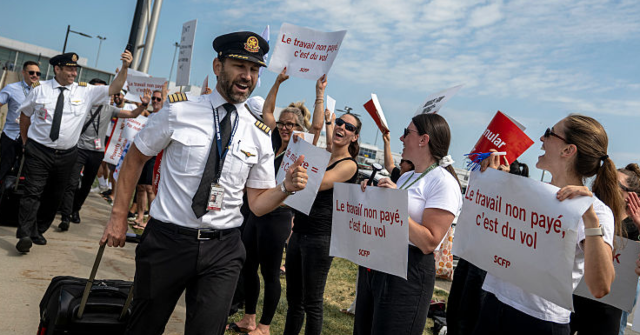Air Canada suspended its plan to resume operations on Sunday after the flight attendants union said it would defy a return-to-work order.
The airline denounced the union’s actions as “illegal” and said it now hopes to resume flights on Monday night.
The Air Canada shutdown began on Saturday, driven by a months-long dispute over wages. Flight attendants demanded to be paid for “ground time” work they perform before takeoff and after landing, whereas the current system only pays them for the time between aircraft closing and re-opening their doors.
The union also complained that wages for flight attendants have not been increased to keep pace with inflation. The union billed its demands as a plea for “fair pay” and touted polls that up to 88 percent of the public supported the flight attendants.
Those numbers might have shifted after Saturday’s work stoppage all but paralyzed Canada’s largest airline, leaving some 130,000 passengers stranded at their terminals. Within 12 hours, the Canada Industrial Relations Board (CIRB) stepped in with an unusually swift and firm order to return to work, invoking a section of the Canada Labor Code that allows the board to end work stoppages in order to “maintain or secure industrial peace.”
This particular aspect of the labor code was relatively obscure until last year when the Liberal Party government began using it to halt damaging strikes at ports and railroads. Unions have been pushing back with lawsuits that claim return-to-work orders violate their constitutional right to strike and collectively bargain.
Canadian Minister of Jobs and Families Patty Hajdu said the order was necessary because “the potential for immediate negative impact on Canadians and our economy is simply too great.”
“Now is not the time to take risks with our economy. A work stoppage would cause thousands of Canadians to be stranded abroad and across this country and this is simply unacceptable,” Hajdu said on Sunday, pointing to heavy economic pressure from President Donald Trump’s tariffs.
The Canadian Union of Public Employees (CUPE) immediately announced it would ignore the return-to-work order, setting the stage for a showdown. Among other objections, CUPE argued the CIRB had a conflict of interest in the case because its chairwoman, Maryse Tremblay, once served as legal counsel to Air Canada.
“We will be challenging this blatantly unconstitutional order that violates the Charter rights of 10,000 flight attendants, 70 per cent of whom are women, and 100 per cent of whom are forced to do hours of unpaid work by their employer every time they come to work,” the union declared.
Outright defiance of a return-to-work order is even more unusual than the Canadian government issuing them. Union leaders could potentially face fines and jail time, if the CIRB chooses to press the issue.
“Our members are not going back to work. We are saying no,” CUPE President Mark Hancock insisted on Sunday. He physically ripped a copy of the return-to-work order to shreds outside the departure terminal of Pearson International Airport in Toronto to emphasize his point.
Although Air Canada said it was merely suspending its plans for resuming service for a single day, Hancock said the flight attendants would not be returning to work on Tuesday, either, unless their demands were met.
“Air Canada has really refused to bargain with us and they refused to bargain with us because they knew this government would come in on their white horse and try and save the day,” he complained.
CUPE has already refused a request from Air Canada to begin third-party arbitration of the dispute — an approach that ended last year’s railroad strike although the railroad union later declared itself unsatisfied with the result and filed suit against the arbitration process.
The union also refused Air Canada’s offer of a 38 percent wage increase over four years, plus benefits and pension increases, because the eight percent increase offered in the first years was deemed insufficient to keep pace with inflation.
Air Canada normally operates about 700 flights per day during the busy summer travel season, so other airlines have proven unable to handle the thousands of passengers who requested refunds for their canceled Air Canada tickets.
Read the full article here



